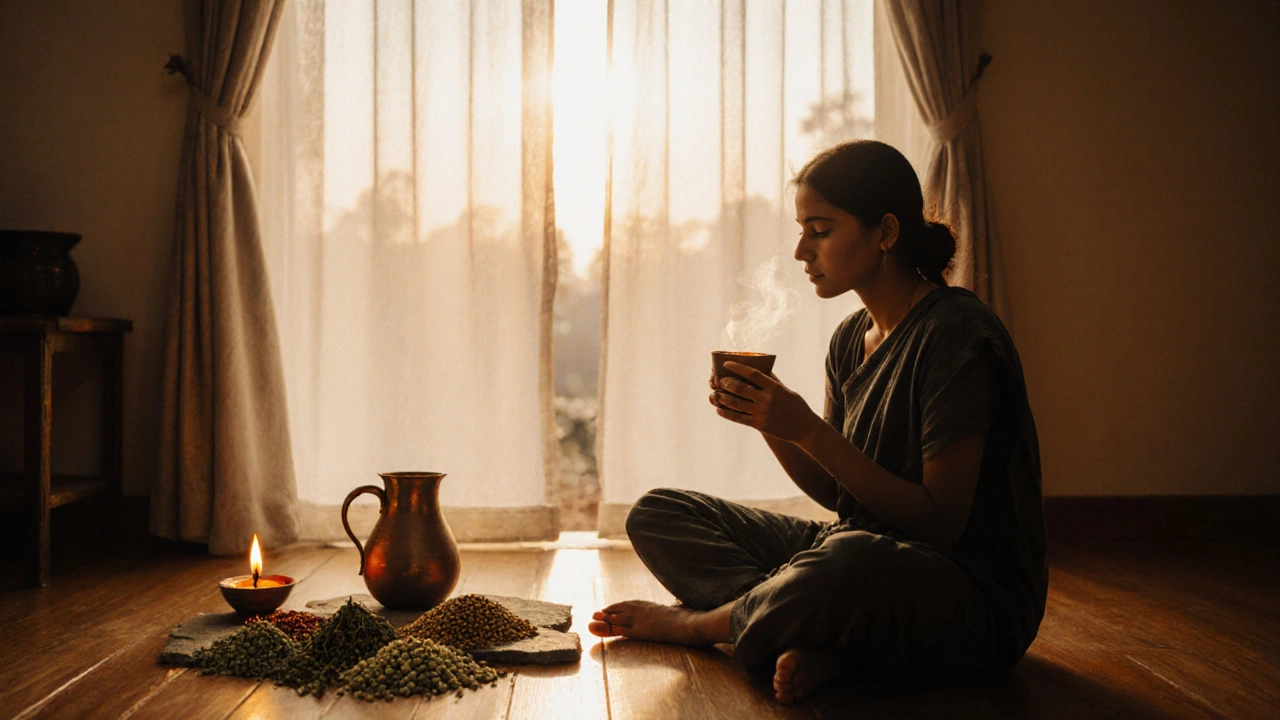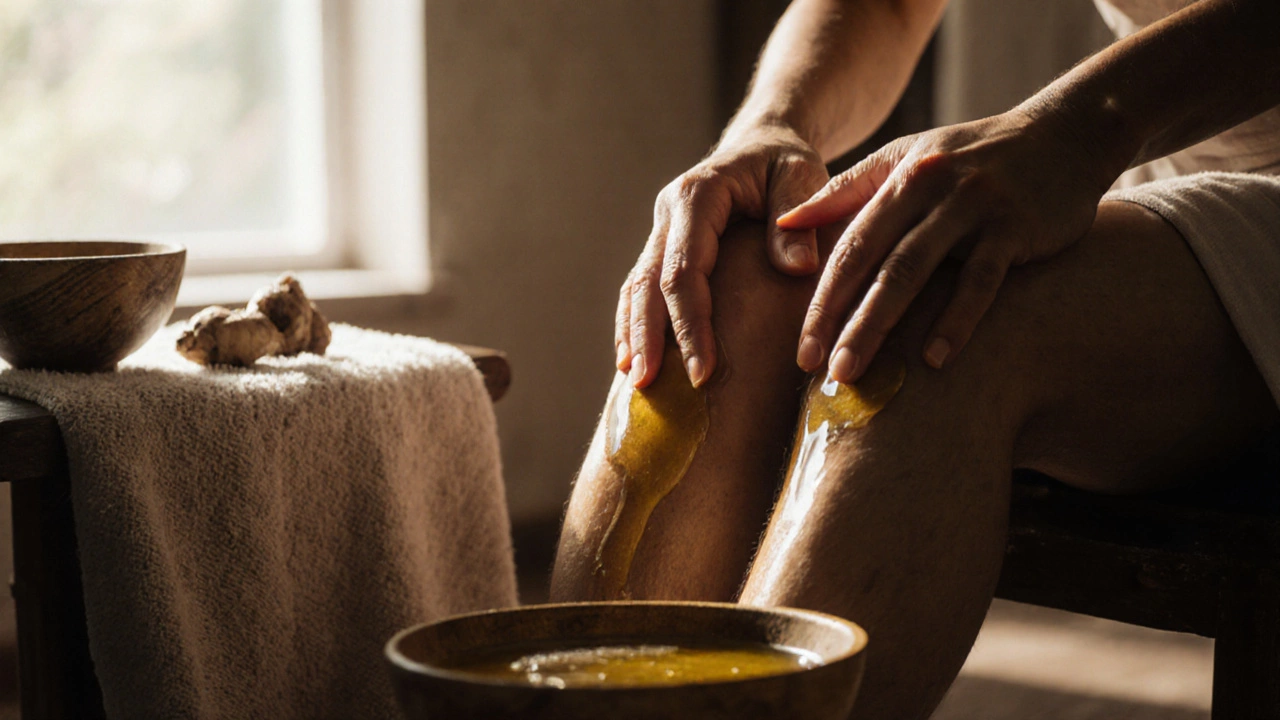How Long Does It Take for Ayurveda to Work? Real Timelines for Common Conditions
 Nov, 21 2025
Nov, 21 2025
People often ask, Ayurveda takes too long to work - but that’s not the whole story. The truth is, Ayurveda doesn’t work like a painkiller you swallow and forget. It’s not designed to mask symptoms overnight. It’s a system built to heal from the inside out, and that takes time. If you’re coming from a world of fast fixes - antibiotics, anti-inflammatories, or sleep aids - Ayurveda might feel slow. But if you’ve been struggling with chronic fatigue, digestive issues, or stress that won’t quit, you might already know that quick fixes don’t fix anything. They just delay the real problem.
Why Ayurveda Feels Slow
Ayurveda doesn’t treat symptoms. It treats imbalance. That means if you’ve had acid reflux for five years, your body isn’t just reacting to spicy food - it’s been slowly losing its ability to digest properly. Your liver, gut flora, and nervous system have all been under strain. Ayurveda doesn’t just calm the stomach. It rebuilds digestion. That takes weeks, sometimes months.
Think of it like fixing a leaky roof. Spraying water on the floor isn’t helping. You need to find the hole, replace the shingles, and let the wood dry out. Ayurveda is the roof repair. And dry wood doesn’t happen overnight.
Typical Timelines for Common Conditions
There’s no universal clock for Ayurveda. But based on thousands of documented cases - from clinics in Kerala to private practices in Birmingham - here’s what most people experience:
- Mild digestive issues (bloating, occasional constipation): 2-6 weeks. Many feel lighter, sleep better, and notice less gas within the first month. Diet changes and herbal teas like triphala often show results fast.
- Chronic stress or anxiety: 6-12 weeks. Ayurveda uses herbs like ashwagandha and brahmi, but they don’t work alone. You also need daily routines - waking up before sunrise, oil massage, breathing exercises. These habits rewire your nervous system. You won’t feel calm on day 3. But by week 8, you’ll notice you’re not jumping at loud noises anymore.
- Joint pain or arthritis: 3-6 months. This isn’t about reducing inflammation with turmeric alone. It’s about clearing ama (toxins) from the joints, improving circulation, and rebuilding cartilage-supporting tissues. One woman in Birmingham, 62, stopped using her cane after four months of daily sesame oil massage, warm ginger tea, and yoga. She didn’t take a single pill.
- Hormonal imbalance (PCOS, irregular cycles, low energy): 4-8 months. Hormones don’t reset with a single herb. They need consistent rhythm: meals at the same time, sleep before 10 p.m., no screens after dark. Ayurveda aligns your life with nature’s cycles. That’s powerful - but slow.
- Autoimmune conditions (thyroid, eczema, rheumatoid arthritis): 6-18 months. This is deep healing. The immune system has been attacking your own body for years. Ayurveda retrains it. That means months of strict diet, detox protocols, and emotional work. One man with psoriasis saw his skin clear after 14 months. He had tried steroids, light therapy, and biologics. Nothing stuck. Ayurveda did - because it didn’t suppress. It healed.
What Speeds Up Results
Some people see results in weeks. Others wait a year. Why the difference? It’s not magic. It’s compliance.
Here’s what actually moves the needle:
- Consistency over intensity. Taking herbs for three days and stopping doesn’t help. Taking them daily for 60 days does.
- Diet is 70% of the work. If you’re eating processed sugar, dairy, or fried food while taking triphala, you’re fighting yourself. Ayurveda isn’t a supplement. It’s a lifestyle.
- Timing matters. Taking herbs after meals? Before bed? At sunrise? Each herb has a window. Miss it, and the effect drops by half.
- Stress management isn’t optional. If you’re chronically stressed, your body can’t heal. Even the best herbs won’t work if you’re sleeping at 2 a.m. and scrolling through your phone.

What Slows It Down
People get discouraged when they don’t feel better fast. But often, they’re sabotaging their own progress without realizing it.
- Switching practitioners too often. Every new doctor changes the plan. Your body gets confused. Stick with one trusted guide for at least three months.
- Expecting miracles. Ayurveda won’t cure cancer in 30 days. It won’t make you 20 years younger overnight. It will help you live better, with less pain, more energy, and deeper peace - over time.
- Ignoring emotional patterns. Anger, grief, and fear don’t just live in your mind. They live in your liver, your gut, your throat. If you’re suppressing emotions, your body stays stuck.
- Buying into quick-fix Ayurveda products. Those $50 “detox teas” on Amazon? They’re not Ayurveda. Real Ayurveda is personalized. It’s based on your dosha, your digestion, your sleep, your stress levels. One-size-fits-all doesn’t work.
Real Stories, Real Time
In 2023, a study in the Journal of Ayurveda and Integrative Medicine tracked 120 people with chronic insomnia. Half took melatonin. Half followed an Ayurvedic routine: warm milk with nutmeg, oil on the scalp, no screens after 8 p.m., and a bedtime before 10 p.m. After six weeks, the melatonin group slept 40 minutes longer. The Ayurveda group slept 2 hours longer - and stayed asleep. No pills. Just rhythm.
Another case: a 48-year-old teacher in London had acid reflux for 12 years. She took PPIs daily. When she switched to Ayurveda - eating warm, cooked meals, avoiding cold drinks, sipping cumin-fennel-coriander tea after meals - her symptoms dropped by 80% in 10 weeks. She stopped her pills at 14 weeks. No relapse in two years.
When to Reassess
Don’t quit Ayurveda because it’s slow. But don’t stay stuck either. Here’s when to pause and reevaluate:
- You’ve followed the plan for 3 months with no change in symptoms.
- Your energy is worse, not better.
- You’re feeling more anxious or bloated after starting herbs.
These aren’t signs it’s not working. They’re signs it’s not right for you - yet. Maybe the herbs are too strong. Maybe your diet isn’t aligned. Maybe you need a different practitioner. Talk to someone who’s been doing this for 15+ years. Don’t guess.

What to Expect After 6 Months
If you’ve stuck with it, here’s what most people report:
- You wake up without an alarm - naturally.
- You don’t crave sugar or caffeine anymore.
- You sleep through the night.
- You feel calm in situations that used to stress you out.
- You notice your digestion is smooth - no bloating, no constipation, no urgency.
- You don’t need painkillers for headaches or joint pain.
This isn’t hype. This is what happens when your body finally gets the support it’s been asking for.
Final Thought: Patience Is the Medicine
Ayurveda doesn’t promise speed. It promises depth. It doesn’t ask you to take a pill. It asks you to change your life. And that’s why it works - when you let it.
If you’re ready to heal - not just manage - then give it time. Six weeks to see a shift. Six months to feel different. A year to feel like a new person.
Does Ayurveda work for acute illnesses like colds or flu?
Yes, but not as a replacement for urgent care. For a cold or flu, Ayurveda can speed up recovery with ginger tea, steam inhalation, and rest. Herbs like tulsi and black pepper help clear congestion and boost immunity. But if you have a high fever, trouble breathing, or symptoms lasting more than 7 days, see a doctor. Ayurveda supports healing - it doesn’t replace emergency treatment.
Can I take Ayurvedic herbs with my prescription meds?
Sometimes, but never without talking to both your doctor and your Ayurvedic practitioner. Some herbs like ashwagandha or guggul can interact with thyroid meds, blood thinners, or antidepressants. A qualified practitioner will know which combinations are safe. Never self-prescribe herbs while on medication.
Are Ayurvedic herbs regulated in the UK?
Ayurvedic herbs sold as supplements in the UK fall under the Food Standards Agency’s regulations. They can’t make medical claims unless they’re licensed as medicines. That means you’ll see labels like "traditional herbal remedy" - not "cures arthritis." Always buy from reputable sources that list ingredients and dosages. Avoid products with heavy metals or undisclosed fillers.
How do I find a qualified Ayurvedic practitioner in the UK?
Look for practitioners registered with the Ayurvedic Practitioners Association (APA) or the Register of Ayurvedic Practitioners (RAP). These bodies require 3+ years of training, clinical experience, and continuing education. Avoid anyone who offers online diagnosis based on a questionnaire alone. Real Ayurveda includes pulse reading, tongue analysis, and detailed lifestyle questioning.
Do I have to follow a strict vegetarian diet with Ayurveda?
No. While many Ayurvedic traditions promote plant-based eating, the system is flexible. Your diet is based on your dosha and digestion. Someone with strong Pitta might do well with occasional fish or chicken. Someone with weak Agni (digestive fire) might need easily digestible foods like lentils and rice. The goal isn’t to be vegan - it’s to eat what your body can process without creating toxins.
What if I don’t see results after 6 months?
First, ask yourself: Did I follow the plan exactly? Did I avoid sugar, caffeine, and late nights? Did I take the herbs at the right time? If yes, then your condition may need a different approach. Some chronic issues require deeper detox (Panchakarma), emotional therapy, or integration with other healing systems. Don’t blame Ayurveda. Reassess with your practitioner. Healing isn’t linear - and sometimes, you need to change direction.
Next Steps
Start small. Pick one thing: drink warm water with lemon every morning. Or go to bed 30 minutes earlier. Or skip your evening snack. Do that for 14 days. Then add another. Ayurveda isn’t about doing everything at once. It’s about doing the right thing, consistently.
If you’re serious about healing - not just trying something new - give it six months. Not because it’s magic. But because your body deserves that much time to remember how to be well.